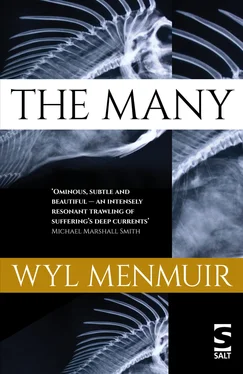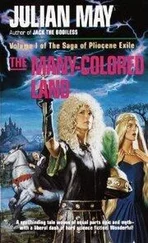Wyl Menmuir - The Many
Здесь есть возможность читать онлайн «Wyl Menmuir - The Many» весь текст электронной книги совершенно бесплатно (целиком полную версию без сокращений). В некоторых случаях можно слушать аудио, скачать через торрент в формате fb2 и присутствует краткое содержание. Год выпуска: 2016, Издательство: Salt, Жанр: Современная проза, на английском языке. Описание произведения, (предисловие) а так же отзывы посетителей доступны на портале библиотеки ЛибКат.
- Название:The Many
- Автор:
- Издательство:Salt
- Жанр:
- Год:2016
- ISBN:нет данных
- Рейтинг книги:4 / 5. Голосов: 1
-
Избранное:Добавить в избранное
- Отзывы:
-
Ваша оценка:
- 80
- 1
- 2
- 3
- 4
- 5
The Many: краткое содержание, описание и аннотация
Предлагаем к чтению аннотацию, описание, краткое содержание или предисловие (зависит от того, что написал сам автор книги «The Many»). Если вы не нашли необходимую информацию о книге — напишите в комментариях, мы постараемся отыскать её.
The Many — читать онлайн бесплатно полную книгу (весь текст) целиком
Ниже представлен текст книги, разбитый по страницам. Система сохранения места последней прочитанной страницы, позволяет с удобством читать онлайн бесплатно книгу «The Many», без необходимости каждый раз заново искать на чём Вы остановились. Поставьте закладку, и сможете в любой момент перейти на страницу, на которой закончили чтение.
Интервал:
Закладка:
The only place that is free of the cracks is the sea itself, as though it is somehow immune to them, as if, even though they emanate from the sea, they are not of the sea. He takes to looking at the water for longer and longer periods, trying to calm himself, though the lines are now starting to cover the lenses of his eyes and no amount of blinking or rubbing at them makes a difference. Towards the end of the day he starts to hear a sound coming from within the fissures, though it is faint and whispered and if he stares at the sea hard enough, he is able to block out the noise for a while. And faint though it is, he recognises the sound, recognises it as a voice he knows almost as well as he knows his own. He strains to hear the words the voice is speaking but it is too distant for him to make anything out, too deep within the cracks.
He stays on the beach looking at the water until darkness falls hard enough to mask the lines on his skin and on the stones. As it gets later, he realises all there is to tell him they are still there is the faint sound that is so soft yet can be heard above the white noise of the waves.
He puts his ear to the ground and listens and after a while the sound of the waves ceases entirely and he is able to hear the voice from within the cracks clearly then. Soft and insistent as the moving of the air, though there are still no words that form, and he presses his ear to the cold ground hard. As he does so, Timothy’s question comes back to him, ‘Who was Perran?’ And the feeling he cannot answer this question is one he is unable to describe, but now he has thought it, it seems to come, too, from the cracks in the surface of everything.
23. Timothy
THEIR SON ARRIVES in a small black people carrier, accompanied by a man and a woman, who, in any other setting, would look like bankers or lawyers. Timothy approaches the car as it pulls up beneath the overhanging roof by the chapel door. The pair get out of the car and open the car boot and when he sees them waiting there and looking over at him, Timothy comes round to join them at the back of the car. He is surprised when the man asks if he wants to carry the coffin into the chapel. It is not something he had considered before this moment and the men have already made a space for him at the car’s open boot. He nods, and a few minutes later, when both his and Lauren’s families have gathered, he takes the small coffin from the waiting man and carries it in his arms to where a chaplain he has not seen before is standing by the open door to the chapel.
When they emerge from the service, Timothy looks around him and blinks in the hard light. To one side the chimney and red-brick sharpness of the crematorium walls, to the other silver and bronze plaques which run the length of a low wall on which another family are already sitting, waiting their turn. Beyond the wall the uniformity of the memorial garden stretches out. Small white markers, regimented and even, lead his eyes to a dark line of trees, which mark the boundary of the cemetery. The chaplain leads them through the garden to a small clearing, at the centre of which is a larger white memorial. Laid around it are toy bears, plastic toys, cards, flowers, all wrapped in cellophane against the rain. As they head towards it, Timothy holds back from the rest of the gathering and the chaplain slows his pace a little.
‘Will there be any ashes for us to scatter?’ he asks.
‘No. I’m afraid that won’t be possible,’ the chaplain replies. ‘Not with a child that small. It’s not possible.’
The chaplain continues talking to him and Timothy tries to concentrate on what he is saying but cannot block out the low roar of the motorway beyond the trees and cannot fix the words being spoken to him and they drift away.
Later, back at home, he tries to bring to mind his son, but all his memory can return for him is the sight of the crematorium tower, the dull roar of the motorway like surf on the sand, and the sense of being hemmed in on all sides.
Timothy walks through the house and removes the dustsheets from the furniture and the carpets. It does not surprise him somehow that the damage he should expect to see, that was so viscerally present only hours earlier, has gone, that the house has reclaimed itself even from this attack. He walks up the stairs and again it is no surprise to him that the plasterwork on the walls all the way up the stairs has reverted to how it was when he first arrived. The same watermarks show through on the walls and ceilings. He has the sensation that when he walks away from the house for the final time, any memory he currently holds of it will fade completely and he will be unable to describe it to Lauren at all, what it was like to be here, to live in this place for so long. He wonders whether the same will be true of his memories of the village as a whole, that all that has taken place since he arrived would fade. As he looks out of the window in the small bedroom towards the sea, he runs his fingers along the windowpane and flecks of dried paint peel off beneath his fingertips.
It’s hard to get rid of fresh cut flowers. They come in waves after the first couple of days, as news gets round. They arrive in bunches of bunches, and each delivery driver who knocks greets them with a smile and congratulates them as they open the door to receive yet more. More cut flowers than he has ever seen in one place outside a florist’s. After the spare shelves and windowsills are taken, the kitchen units fill, the sink, and eventually two buckets on the kitchen floor. They are crowded in by the flowers and thoughts of people they know well and those they barely know, by relatives neither of them has spoken to in years and by neighbours who bring plates of food and yet more flowers.
When the flowers get too much, Timothy looks up the addresses of all the local care homes and notes them down on the back of an envelope. He waits until the majority of their neighbours have left for work, and fills the car with the flowers, still in their cellophane collars and coloured paper wrappings. He has tried to make sure he has removed all the little cards that accompany each of the bouquets, and he checks each of them in turn as he lays them in the boot and, when the boot is full, the back seats and the front passenger seat of the car. He follows a route that takes him in a circle around the edge of the town, stopping at each of the addresses he has listed on the envelope in turn. A man stops him as he is walking up the driveway of one of the smaller care homes with several bunches in his hands, and Timothy is surprised when he asks how much he wants for the flowers. When Timothy replies he is giving them away, the man looks at him with suspicion and says he will only take one bunch, as though he imagines an invoice will be pushed through the door later. As he returns home, there are still several bouquets in the boot of the car and he drops them off outside a small and deserted Catholic church at the turning into his road. The church is a modern one and the entrance is all plate glass with light wood for the window frames and the desk in the entrance hall. In the hall stands a faded plaster Virgin Mary, who looks out of place standing alone on the expanse of office carpet in the vestibule, looking as though she belongs in another place altogether. She stares out into the empty car park with sad eyes. He leaves the remaining bunches of flowers outside the locked door, though he is sure, when they are discovered, they will be swept up into a bin, but he is too tired of the flowers to return with them.
The village is quiet, and the sun is just starting to set, the fullness of its orb just beginning to flatten at the bottom against the horizon. Timothy can make out, over the rooftops and twisting streets that run down to the water below, dark specks on the water that are the boats of the fleet, spread out across the sea. He looks out beyond the boats to where the sun’s light is brightest on the water, and it takes a while for him to realise the container ships punctuating the horizon seem more distant now, further away than they had been before. He wonders whether perhaps they will continue to drift out and eventually they will drop off the edge altogether. Or whether perhaps they will return later in greater numbers.
Читать дальшеИнтервал:
Закладка:
Похожие книги на «The Many»
Представляем Вашему вниманию похожие книги на «The Many» списком для выбора. Мы отобрали схожую по названию и смыслу литературу в надежде предоставить читателям больше вариантов отыскать новые, интересные, ещё непрочитанные произведения.
Обсуждение, отзывы о книге «The Many» и просто собственные мнения читателей. Оставьте ваши комментарии, напишите, что Вы думаете о произведении, его смысле или главных героях. Укажите что конкретно понравилось, а что нет, и почему Вы так считаете.











